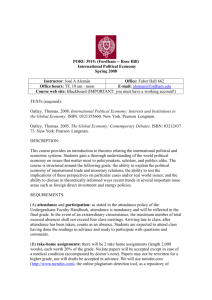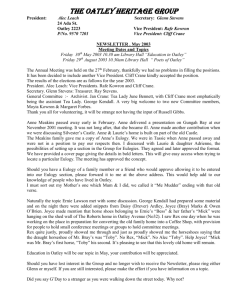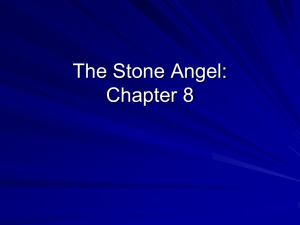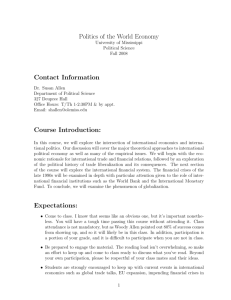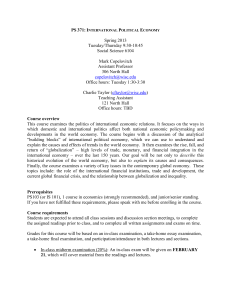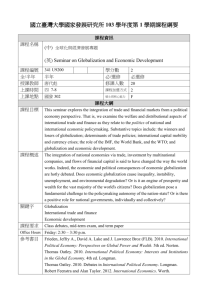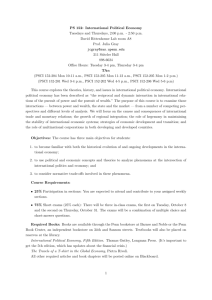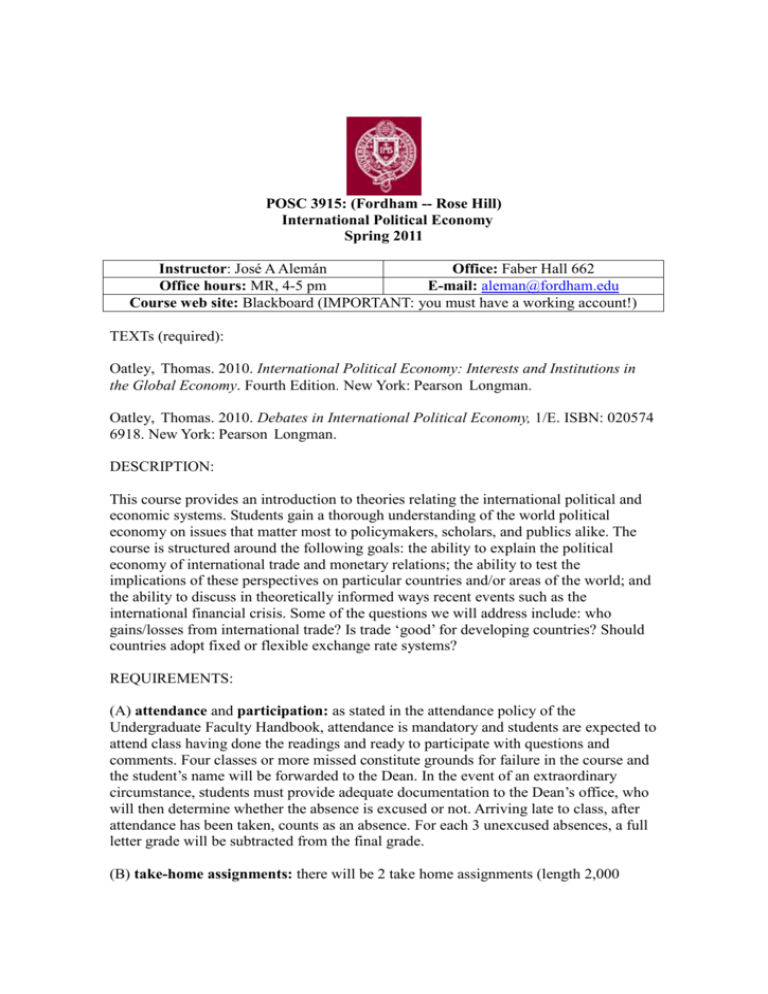
POSC 3915: (Fordham -- Rose Hill)
International Political Economy
Spring 2011
Instructor: José A Alemán
Office: Faber Hall 662
Office hours: MR, 4-5 pm
E-mail: aleman@fordham.edu
Course web site: Blackboard (IMPORTANT: you must have a working account!)
TEXTs (required):
Oatley, Thomas. 2010. International Political Economy: Interests and Institutions in
the Global Economy. Fourth Edition. New York: Pearson Longman.
Oatley, Thomas. 2010. Debates in International Political Economy, 1/E. ISBN: 020574
6918. New York: Pearson Longman.
DESCRIPTION:
This course provides an introduction to theories relating the international political and
economic systems. Students gain a thorough understanding of the world political
economy on issues that matter most to policymakers, scholars, and publics alike. The
course is structured around the following goals: the ability to explain the political
economy of international trade and monetary relations; the ability to test the
implications of these perspectives on particular countries and/or areas of the world; and
the ability to discuss in theoretically informed ways recent events such as the
international financial crisis. Some of the questions we will address include: who
gains/losses from international trade? Is trade ‘good’ for developing countries? Should
countries adopt fixed or flexible exchange rate systems?
REQUIREMENTS:
(A) attendance and participation: as stated in the attendance policy of the
Undergraduate Faculty Handbook, attendance is mandatory and students are expected to
attend class having done the readings and ready to participate with questions and
comments. Four classes or more missed constitute grounds for failure in the course and
the student’s name will be forwarded to the Dean. In the event of an extraordinary
circumstance, students must provide adequate documentation to the Dean’s office, who
will then determine whether the absence is excused or not. Arriving late to class, after
attendance has been taken, counts as an absence. For each 3 unexcused absences, a full
letter grade will be subtracted from the final grade.
(B) take-home assignments: there will be 2 take home assignments (length 2,000
words), each worth 20% of the grade. No late papers will be accepted except in case of
a medical condition (accompanied by doctor’s note). Papers may not be rewritten for a
higher grade, nor will drafts be accepted in advance. We will use turnitin.com
(http://www.turnitin.com), the online plagiarism detection tool, as a repository of
written assignments. See blackboard for further details.
(C) mid term and final examinations: exams will be done in class. Cheating (using
unauthorized materials or giving unauthorized assistance during an examination or other
academic exercise) and plagiarism (using others' ideas and words without
acknowledgment) are serious offenses and will be forwarded to the Dean.
EVALUATION:
(A) class participation: 10%
(B) take-home assignments: 40%
(C) midterm examination: 25%
(D) final examination: 25%
On all papers and exams, evaluation is based on a thorough understanding and
command of the materials presented in lectures and readings, original critical analyses
of those materials, and an attempt to think about how those ideas make sense of
particular countries or experiences in the real world. No extra credit opportunities
should be requested in case you do poorly in exams and/or papers.
- “A” grades will be awarded to work that accomplishes these goals.
- “B” grades will be awarded to work that manages to accomplish some of these
goals.
- “C” grades will be awarded to work that manages to accomplish only one of these
goals adequately.
- Reasonable attempts to complete the assignments, but with virtually no success
will be awarded “D” grades.
- “F” grades will be recorded for assignments that are not completed in a remotely
acceptable manner.
RESOURCES:
(A) books: the above list of texts are required and available for purchase at the Fordham
University bookstore or on reserve at Walsh library. Additional handouts and readings
will be made available online through blackboard.
(B) Blackboard: each student must obtain a blackboard account. This is a web-based
platform used to administer course announcements and grades, and additional course
materials.
(C) special assistance: students with disabilities should contact the instructor at the
beginning of the semester to allow for coordination of assistance with the Office of
Disability Services (ODS). Students in need of assistance with class assignments should
contact or visit the Writing Center (x4032) located in Dealy E-533.
Course schedule
1/20
1/24
1/27
1/31
2/3
2/7
2/10
2/14
2/17
2/22
2/24
2/28
3/3
3/7
3/10
3/14-3/21
3/21
3/24
3/28
3/31
4/4
Introduction. What is IPE?
(no readings)
Traditional Schools of International Political Economy
Oatley (chapter 1)
The World Trading System: Origins
Oatley (chapter 2)
The World Trading System: Contemporary Challenges
Oatley (chapter 2)
Economic Case for Trade
Oatley (chapter 3)
The Economic Impact of Trade
Scott vs. Irwin
The Politics of Trade Cooperation
Oatley (chapter 3)
The WTO and Political Legitimacy
Esty vs. Henderson
Domestic Politics of Trade
Oatley (chapter 4)
Retrain Workers vs. Redistribute Income
Rosen vs. Scheve and Slaughter
Political Institutions and Interests
Oatley (chapter 4)
review
midterm
The WTO and the Environment
Wallack & Sforza vs. Weinstein and Charnovitz
Monetary systems and currencies
No readings
Spring Recess
“Inside Job” screening
No readings
Fixed vs. Floating Exchange Rate Systems
Oatley (chapter 10)
Balance of Payments and Balance of Payments Adjustments
Oatley (chapter 10)
The Bretton Woods Monetary System
Oatley (chapter 10)
The Unholy Trinity
4/7
4/11
4/14
4/18
4/21-4/25
4/28
4/31
5/4
Oatley (chapter 11)
Exchange Rate Cooperation in the European Monetary System
Oatley (chapter 11)
The Rise of the Euro and China
Ferguson vs. Cohen and Subacchi; Bergstein vs. Hale and Hale
Developing Countries and the IMF
Claessens versus Eichengreen
Krugman: “How Did Economists Get it So Wrong?”
Blackboard reading
Easter Recess
Electoral Models of Monetary Politics
Oatley (chapter 12)
Monetary Policy and Unemployment
Oatley (chapter 13)
review

